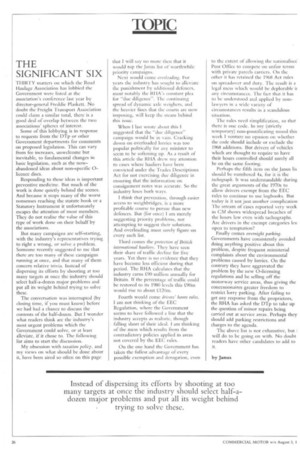TOPIC
Page 30

If you've noticed an error in this article please click here to report it so we can fix it.
• THE SIGNIFICANT SIX
THIRTY matters on which the Road Haulage Association has lobbied the Government were listed at the association's conference last year by director-general Freddie Plaskett. No doubt the Freight Transport Association could claim a similar total, there is a good deal of overlap between the two associations' spheres of interest.
Some of this lobbying is in response to requests from the DTp or other Government departments for comments on proposed legislation. This can vary from fee increases, unwelcome but inevitable, to fundamental changes in basic legislation, such as the nowabandoned ideas about non-specific 0licence discs.
Responding to these ideas is important preventive medicine. But much of the work is done quietly behind the scenes. And because it stops many of the worst nonsenses reaching the statute book or a Statutory Instrument it unfortunately escapes the attention of most members. They do not realise the value of this type of work done on their behalf by the associations.
But many campaigns are self-starting, with the industry's representatives trying to right a wrong, or solve a problem. Someone recently suggested to me that there are too many of these campaigns running at once, and that many of them concern relative trivia. Instead of dispersing its efforts by shooting at too many targets at once the industry should select half-a-dozen major problems and put all its weight behind trying to solve these.
The conversation was interrupted (by closing time, if you must know) before we had had a chance to discuss the contents of the half-dozen. But I wonder what readers think are the industry's most urgent problems which the Government could solve, or at least alleviate, if it chose to. The following list aims to start the discussion.
My obsession with taxation policy, and my views on what should be done about it, have been aired so often on this page that I will say no more then that it would top the Janus list of worthwhile priority campaigns.
Next would come overloading. For years the industry has sought to alleviate the punishment by additional defences, most notably the RI IA's constant plea for "due diligence". The continuing spread of dynamic axle weighers, and the heavier fines that the courts are now imposing, will keep the steam behind this issue.
When I last wrote about this 1 suggested that the "due diligence" campaign would be in vain. Cracking down on overloaded lorries was too popular politically for any minister to seem to be softening up. As a result of this article the RHA drew my attention to cases where hauliers have been convicted under the Trades Descriptions Act for not exercising due diligence in ensuring that the information on consignment notes was accurate. So the industry loses both ways.
I think that prevention, through easier access to weighbridges, is a more profitable course to pursue than new defences. But (for Once) I am merely suggesting priority problems, not attempting to suggest their solutions. And overloading must surely figure on every such list.
Third comes the protection of British. international hauliers. They have seen their share of traffic decline for five years. Yet there is no evidence that they have become less efficient during that period. The RHA calculates that the industry earns £90 million annually for Britain. If the percentage of traffic could be restored to its 1980 levels this 3:90m would rise to about £120m.
Fourth would come drivers' hours rules. I am not thinking of the EEC Regulation, where the Government seems to have followed a line that the industry accepts as realistic, though
• falling short of their ideal. I am thinking of the mess which results from the contradictory policies applied in areas not covered by the EEC rules.
On the one hand the Government has taken the fullest advantage of every possible exemption and derogation, even
to the extent of alloi,ving the nationalisec Post Office to compete on unfair terms with private parcels carriers. On the other it has retained the 1968 Act rules on spreadover and duty. The result is a legal mess which would be deplorable ii any circumstances. The fact that it has to be understood and applied by nonlawyers in a wide variety of circumstances results in a scandalous situation.
The rules need simplification, so that there is one code. In my (strictly temporary) non-pontificating mood this week I venture no opinion on whether the code should include or exclude the 1968 additions. But drivers of vehicles which are thought to require to have their hours controlled should surely all be on the same footing.
Perhaps the fifth item on the Janus lis should be numbered 4a, for it is the tachograph. It was understandable during the great arguments of the 1970s to allow drivers exempt from the EEC rules to continue to use logbooks. But today is it not just another complication The stream of cases reported very week in CM shows widespread breaches of the hours law even with tachographs. Are drivers in the exempt categories lev open to temptation?
Finally comes overnight parking. Governments have consistently avoided doing anything positive about this problem, despite frequent ministerial .complaints about the environmental problems caused by lorries. On the contrary they have aggravated the problem by the new 0-licensing regulations and be selling off the motorway service areas, thus giving the concessionaires greater freedom to restrict lorry parking. After failing to get any response from the proprietors, the RHA has asked the DTp to take up the question of minor repairs being carried out at service areas. Perhaps they should add parking restrictions and charges to the agenda.
The above list is not exhaustive, but i will do to be going on with. No doubt readers have other candidates to add to it.






















































































